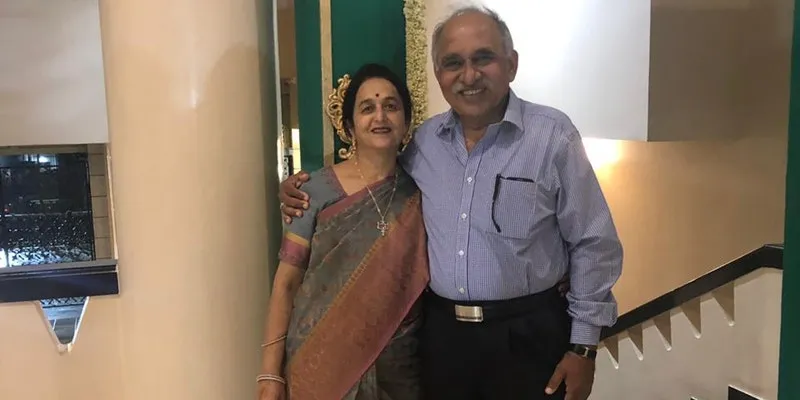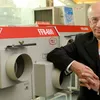How this financier-turned-entrepreneur built a Rs 200 cr company that contributed to ISRO’s Mangalyaan project
Having spent 25 years in the private finance industry, Mukesh Gupta founded Smile Electronics which today boasts of clients like ISRO, Samsung, Bosch, Volvo, and L&T, and clocks a turnover of Rs 200 crore.

Suman Gupta and Mukesh Gupta, Founders, Smile Electronics
There is no set time to find your calling to become an entrepreneur and Mukesh Gupta, Director, Smile Electronics Limited, is the quintessence of this famous saying.
An LLB graduate with 25 years of experience in the private financial market, including running a Category 1 merchant banking enterprise, Mukesh, 63, found a business opportunity in the electronics industry.
In an interaction with SMBStory, second-generation entrepreneur, Ashita Gupta, COO, who joined the company in 2012 says,
“My father had big corporates as clients when he was a financier. He had a fairly good understanding of the electronics industry. With his astute observations, he decided to step into the industry taking guidance from his contacts.”
Financier turns entrepreneur
Mukesh Gupta started Smile Electronics in 2000 as an Electronics Manufacturing Services (EMS) company to deliver design, manufacturing, fulfilment, complete forward and reverse logistics services, and holistic product life cycle management services to technology giants of the world. The company's major shareholder is his wife Suman Gupta besides him.
The company was set up in Bengaluru with a consigned assembly for the defence sector - primarily Bharat Electronics Ltd (BEL).
“In 2000, there was a mass shift of the Public Sector Understakings (PSUs) workforce to the private sector to enable them channelise their efforts into manufacturing basic defence components privately. Smile Electronics bagged the opportunity and our first project with BEL started,” Ashita says.
Smile Electronics grew and included high-tech, highly-complex printed circuit boards for the Airforce and Navy.
Finding a gap in the telecommunications and medical devices sector, Mukesh thought of venturing into this segment as well. However, in 2012, as the telecom infrastructure industry dramatically slowed down in the aftermath of the 2G telecom scandal in India, Smile Electronics decided to diversify itself and targetted large global businesses in other verticals. This required an upgrade in the infrastructure, focus on business, and a change in culture which had been driving its growth since 2015.

Smile Electronics booth at SDA event in Bengaluru
Smile Electronics also has a manufacturing facility in Mysuru with procurement offices in Singapore and Fremont, USA. The company records an annual turnover of Rs 200 crore.
Diversifying into large market and ISRO
In a span of 20 years, Smile Electronics has diversified into manufacturing electronic items on turnkey basis which have applications in consumer electronics, telecommunication, automotive, defence, and aerospace products. The company’s product portfolio and clientele base comprises washing machine (Printed Board Assembly) PBA, refrigeration PBA, airborne telemetry PBA, biometric device PBA, radio frequency PBA, power supply builds, energy meters PBA, wearable electronics, flight control panels, tablets, and phone modules amongst others.
These products find application primarily in the consumer electronics, power, information technology, and telecommunication segments which contributed close to 89 percent of the company’s revenue in FY 2019.
Smile Electronics majorly caters to the domestic market which accounts for approximately 90.80 percent of the total revenue in FY 2019. Export market of the company includes the US, China, South Korea, and Japan.
The strong clientele base of Smile Electronics includes Larsen & Toubro, Samsung, Bosch, Honeywell, TVS, HP, Altran, Volvo, Western Digital, and many more. Smile Electronics is also one of the few companies that contributed to the Mangalyaan project of ISRO.
The company is on the board of the SD Association which is an American non-profit organisation that sets memory card standards intended to simplify the use and optimise the performance of consumer electronics that people across the world use.
In these long years spent in the business, the company has received ISO 14001:2015, AS9100D and ISO 9001:2015, ISO 14001:2004, IATF 16949:2016 and ISO 9001:2005 accreditations from NQA, a British accreditation company for quality management system, manufacturing, assembly, and test and integration of printed circuit board assemblies for aerospace and automotive applications.
Initial struggle and major challenges
Talking about the initial struggle, Ashita says that the manufacturing sector being highly capital intensive, Mukesh in his early days of the business, made a lot of proactive capital investments in the background of a non supportive policy environment.
“The financier in my father never allowed him to be cowed down by the challenges he faced in his early years. However, it didn’t take him long to understand that in a manufacturing sector, one has to keep the money afloat and so he was able to keep a strict control on the expenses.”

Ashita Gupta, COO, Smile Electronics
The company still faces problems with investment, Ashita says.
Other challenges are of finding the right and skilled workforce, and of rising costs.
How to become less dependent on China?
With the coronavirus outbreak, the Indian manufacturing sector has seen a new low. According to many entrepreneurs, it is high time the Make-in-India initiative is stepped up to help the industry become less dependent on China for imports.
Throwing light on this concern, Ashita says that at the policy level, the government has been initiating programmes towards increasing the component supply chain and synthesising a full service ecosystem. There is a dire need to continually incentivise interventions and actions that drive making the Indian hardware industry more self-reliant, self-sufficient, scaled, and globally competitive.
Future prospects
Smile Electronics is planning to expand its manufacturing capabilities and increase its digital footprint by building a new state-of-the-art facility which will house over 25 manufacturing lines, all driven by automation and customer specification, to help provide the best possible solutions to its customers.
The company aims at clocking Rs 500 crore revenue in the next five years, creating more than 1,000 jobs for the domestic workforce. Ashita says the company is also seeing a robust growth in the research and development (R&D) facilities which will soon churn out complete original design manufacturer (ODM) support for many global brands.
(Edited by Javed Gaihlot)









